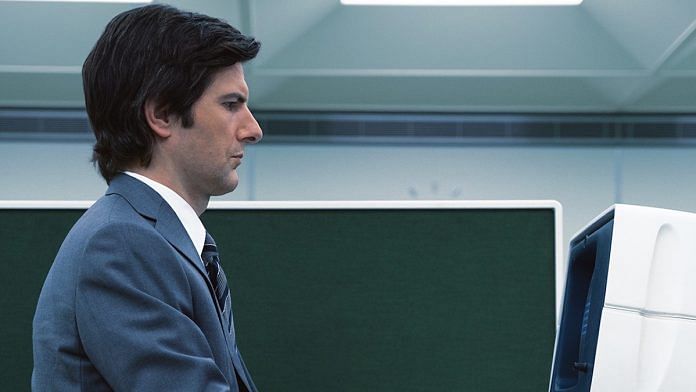What happens when our pursuit of work-life balance becomes so extreme that the two worlds split completely?
If the coronavirus pandemic had sent the office work routine into a tizzy, the Ben Stiller-directed TV series Severance has brought back the focus on the drawbacks of spending too much time at the workplace. While many struggled with getting back to the workplace physically, the new Apple TV+ show offers a fictional alternative and from the looks of it, it makes a rather compelling case.
The web series explores what might happen if you could medically sever your at-work brain from your personal life-brain. In this fictional world, the employees’ outside selves are called “outies” and their selves who stay within the office premises are “innies”. The outie transforms into his/her innie after they step out of the elevator and into their office. So the person at work has no recollection of his/her personal life — rather there is no life beyond what exists in the confines of their workplace, Lumon — and is devoid of any emotional baggage. Similarly, when the outie leaves for home at the end of the day, he/she doesn’t remember what they did in those eight hours of the day. A severed person is deprived of 40 hours per week worth of his/her memories. Isn’t that fascinating?
Also read: All workplaces and managers are faced with one problem today — what to do with millennials?
Struggles with age-old work routine
The pandemic has laid bare the flaws in the age-old work routine. While it forced employers to exercise remote work culture, it blossomed into a blessing in disguise for many employees. Those nursing their newborn or young children or ailing parents, or the ones tending to their personal struggles — ‘work from home’ helped people to retain their jobs while also taking care of their personal affairs. For others, work from home was a curse, it didn’t offer the escape from personal life work usually did and it was harder to stay motivated. As the offices reopened, the commuting among mask-clad travellers has proven to be a harrowing experience for many.
For decades, Nordic countries such as Finland have prioritised and embraced flexible hours and working styles to boost productivity and employee satisfaction. Countries like Japan compensate their employees for commuting to work.
It is safe to say that the concept of ‘workplace’ has evolved — for better or worse — and, often, the work environment and accompanied pressure does little to make lives better. Especially for women, who by virtue of living in patriarchal households, end up working beyond their standard working hours. This fact, of course, is not true for all, but we would be fooling ourselves if we think that most women do not endure this on a daily basis. In fact, a LinkedIn study on India showed, “7 in 10 working women in India quit or consider quitting their jobs due to inflexible work environment”.
Also read: Work-life balance — What really makes us happy might surprise you
Dystopian reality of severance
So, the idea of ‘severance’ might seem tempting but the fictional world is not perfect. On the face of it, it has sleek, symmetrical shots making the series aesthetically pleasing. But the unadulterated work timings devoid of any feelings and personality of self can gradually become frustrating. And scary.
“These are our lives. No one gets to just turn you off,” protagonist Mark Scout (Adam Scott) says in the Apple TV+ series. Although the show depicts that the outies have voluntarily signed up for the severance programme — one is driven by the loss of a loved one, another pushed by loneliness—their innies still want to break free.
The innies are engaged in meaningless activities to keep them engaged and motivated to achieve their professional goals. The work is “mysterious but important”, says Mark while inducting a new employee Helly (Britt Lower). There are also seemingly futile (but well thought out) regulations in place such as restricted access to other departments at the workplace. And, to discipline the innies and keep them in check, there are also punishments in form of a dreadful break room. All this to bring to keep the employees focused on the tasks at hand.
Significance of work-life balance
Severance may just be an extreme measure to tackle the work pressures and stress of contemporary workplaces, but in no way is it sustainable. The pandemic has given us a taste of hybrid workplaces and reverting to the old ways comes with its own challenges.
According to a new Pew Research Center survey, “low pay, lack of opportunities, and feeling disrespected at work” are the prime reasons behind the ‘Great Resignation’ of 2021.
And Severence shows how quickly utopia can become dystopia.
Views are personal.
This article is part of a series called Beyond the Reel on movies and culture.



